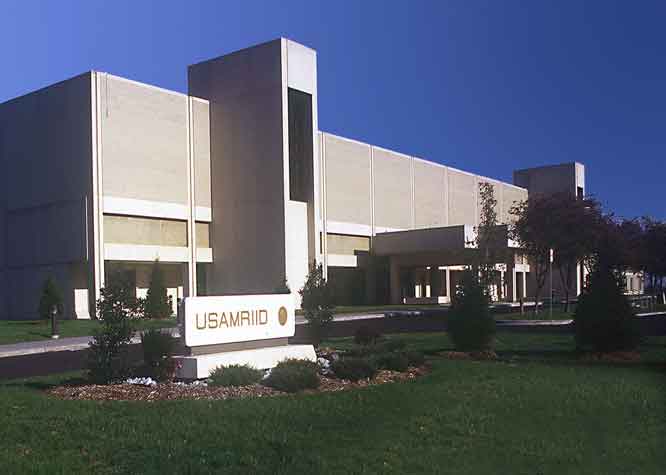
So far, more than 22,000 people in America have been diagnosed with the virus, and more than 280 have died from the respiratory disease associated with Covid-19. U.S. infection rates are likely to climb precipitously as more testing becomes available.
At the White House briefing Wednesday on efforts to combat Covid-19, Defense Secretary Mark Esper said that he had just visited USAMRIID, known in military and research circles as RIID, and was briefed on its work on antiviral drugs and vaccines. But RIID scientists have privately complained about their lack of early serious involvement in the Covid-19 fight.
And Wednesday marked the first time that an official at the daily briefings had specifically mentioned the lab that had helped suppress outbreaks of Venezuelan equine encephalitis virus in South Texas in 1971, Rift Valley Fever in Egypt in 1977, Hantavirus in the southwest in 1993, and Ebola in Reston, Virginia in 1990, as well as in Africa in 1995.
The Daily Beast reported earlier this week that the Pentagon was withholding over $104 million from military labs including RIID, where cutting-edge work on infectious diseases has traditionally been conducted. The Pentagon's overall response to the coronavirus pandemic is almost $1 billion short of funding, the Beast reported.
Biosecurity and global-health experts know that problems at the lab run far deeper than erratic and insufficient budgets. The institute has battled numerous problems, including a failure to adjust to a post-Cold War mission, leadership challenges, and micromanagement by the Defense Department. Once the crown jewel of the Pentagon's scientific effort to protect U.S. soldiers from the 'dirty dozen' germs that the Soviet Union had weaponized for a potential war in Europe, the lab has become an orphan within the Defense Department.
For the last decade, the Defense Threat Reduction Agency (DTRA), the Pentagon division responsible for chemical and biological defensive research, which provides about a third of RIID's budget, has increasingly micromanaged the lab. A decade ago, for instance, DTRA abolished a research unit responsible for developing vaccines and other countermeasures against toxins like botulinum and ricin, an agent of choice for homegrown terrorists. More recently, DTRA barred RIID from using its funds to work on the novel coronavirus.
The Pentagon has also changed how the institute's military commanders are chosen. Historically, commanders had worked as researchers at army labs and were expected to stay in the top job for several years. RIID has had five commanders in the past decade — one every two years. Some of the commanders were excellent leaders, but almost none were research scientists or in their jobs long enough to understand fully the lab's complex structure and wide-ranging research and testing mission.
In 1998, RIID's staff was composed of roughly half uniformed military scientists and technicians and half government civilians, with only two contractors. Since then, the number of contractors has exploded: roughly 300 of the 800-person staff are contractors whose work is tied to funding that has proved unstable. The lack of stability, in turn, has depressed morale. In the past, RIID was a magnet for young scientists. Researchers there went on to hold prestigious jobs at the Centers for Disease Control and Prevention, the Department of Health and Human Services, the World Health Organization, academia, and the private sector. These scientists contributed to an integrated global network of experts who mobilized early to combat deadly infectious-disease outbreaks.
RIID is a far less attractive employer today. Just before the coronavirus outbreak, a senior scientist described the atmosphere there as one of 'fear and mistrust.' Last summer, the lab's civilian senior scientist, who had provided continuity in the front office through the tenures of three commanders and was charged with redefining the lab's mission, was abruptly relieved by the commander, who then departed a few months later on a scheduled army rotation. The deputy commander was ousted at about the same time. In a flash, the headquarters' scientific institutional memory was gone.
Part of the lab's problems are of its own making. While the institute helped lead the scientific effort to analyze the mailed letters and contaminated spaces in the 2001 anthrax attacks — which killed five, infected 17, and put 20,000 Americans on antibiotics — the lab's status and morale plummeted after the FBI accused one of its scientists of having placed the deadly agent in the mail.
A new $1.1 billion lab that had been scheduled to open in 2017 is still not operational. Heavy rains flooded parts of the Cold-War era waste-treatment facility, and a backup system being constructed for the new lab failed as well.
In summer 2019, the CDC issued a warning and then later shut down RIID's high-containment labs for three months. Some labs now operate under limited conditions.
When work stopped in the high-containment, Bio-Safety Level 3 and Level 4 labs, research that accounted for about one-third of the RIID's budget ground to a halt. More than 30 experienced contractors were dismissed. Frustrated, some senior scientists also left.
But current complaints about underfunding are almost a distraction. For years, the institute has been mismanaged and then largely ignored. Rebuilding capacity will require enlightened leadership, a redefined mission, and recognition by the Pentagon and the White House that USAMRIID is a critical insurance policy for the nation's health and biosecurity.
Sign up for the daily JWR update. It's free. Just click here.
(COMMENT, BELOW)
David R. Franz, DVM, Ph.D., is a retired army colonel who served as deputy commander of USAMRIID from 1993 to 1995 and commander from 1995 to 1998. Judith Miller is a contributing editor of City Journal, where this first appeared, and the author of Germs: Biological Weapons and America's Secret War.


 Contact The Editor
Contact The Editor
 Articles By This Author
Articles By This Author